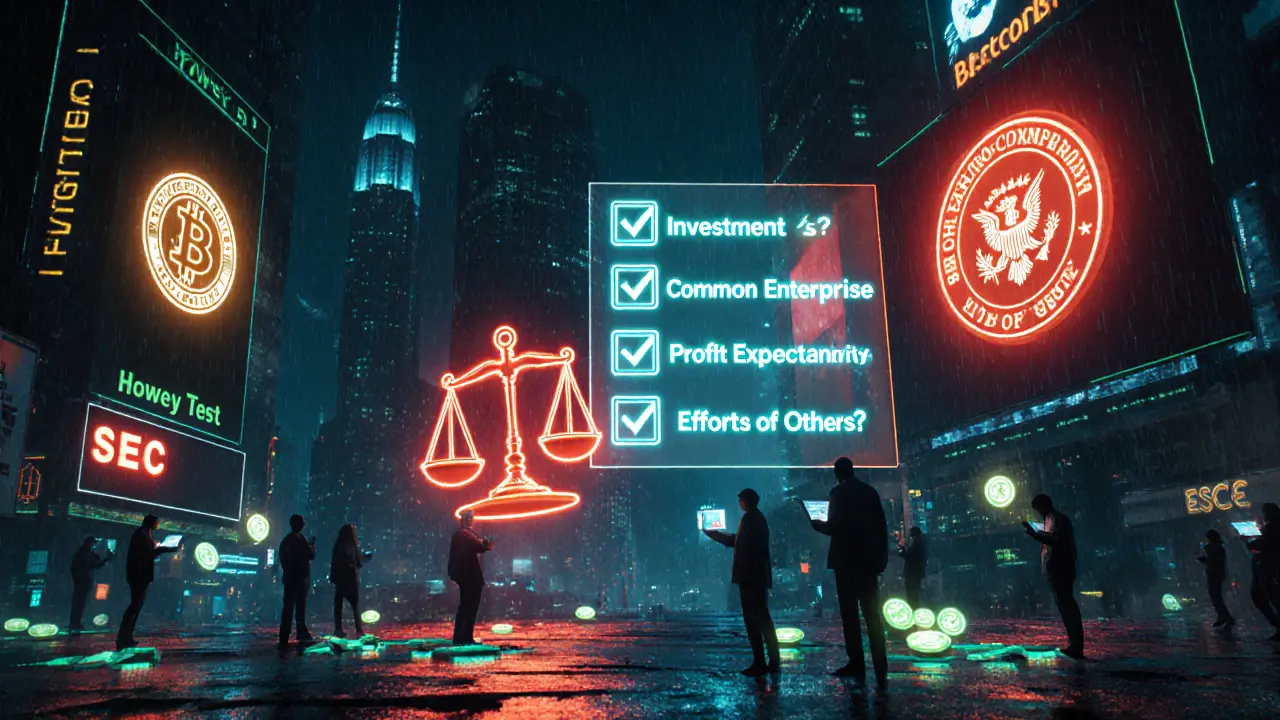When you buy a cryptocurrency like Bitcoin or Ethereum, are you buying a currency-or are you buying a security? That’s the question the SEC has been asking since 2017, and the answer hinges on something called the Howey Test. It’s not a tech tool, not a blockchain protocol, and not something coded into a smart contract. It’s a 78-year-old legal rule from a U.S. Supreme Court case about orange groves. But today, it’s the single most important legal filter deciding whether your favorite crypto token is legal to trade, list on exchanges, or even create in the first place.
What Is the Howey Test?
The Howey Test comes from a 1946 case: SEC v. W.J. Howey Co. Back then, a Florida company sold plots of citrus land to investors. Buyers didn’t farm the land themselves. Instead, they paid Howey to grow and sell the oranges for them, promising profits. The SEC stepped in, saying this wasn’t just a land sale-it was an investment contract, and therefore a security. The Supreme Court agreed and laid out four simple questions to tell the difference:- Is money being invested?
- Is there a common enterprise? (Are your profits tied to others’ success?)
- Do you expect to make a profit?
- Are those profits coming mostly from someone else’s work-not your own?
Why Does the SEC Care About Crypto?
Crypto projects raise billions by selling tokens to the public. Many of these tokens promise returns: “Buy our token now, and when our platform launches, it’ll be worth 10x.” That sounds a lot like the orange grove deal from 1946. The SEC doesn’t care if it’s called a “utility token,” “NFT,” or “governance token.” If the economic reality matches the Howey Test, it’s a security. In 2017, the SEC applied the test to the DAO-a decentralized project that raised $150 million in Ether. Their report said: “Investors expected profits from the DAO’s promoters’ efforts.” That was the first official stamp: crypto tokens can be securities. Since then, the SEC has brought over 78 enforcement actions against crypto firms between 2022 and 2023 alone, collecting $2.8 billion in penalties since 2013.Bitcoin and Ethereum: Why They’re Usually Safe
Bitcoin and Ethereum are the exceptions. The SEC has said Bitcoin doesn’t meet the Howey Test because there’s no central team driving its value. No company owns it. No founder is managing it. No one’s promising future profits from their work. It’s decentralized by design. Ethereum is trickier. In 2018, former SEC official William Hinman said Ether’s sale wasn’t a security because the network had become “sufficiently decentralized.” But that was just a speech-not a rule. The SEC hasn’t officially declared Ethereum a non-security, but it hasn’t sued either. Why? Because the network’s value now comes from millions of miners, validators, and developers-not a single company. That’s the key: decentralization weakens the “efforts of others” prong.
Where Most Tokens Fail the Test
Most tokens fail the Howey Test because they’re built around a startup team that’s still active. Think of a new blockchain project that:- Has a whitepaper promising token price growth
- Has founders who control the treasury and roadmap
- Does marketing campaigns telling buyers to “hodl for big returns”
- Uses funds raised to pay salaries, not build the product
The Ripple Case: A Split Decision
The Ripple case in 2023 was a turning point. Judge Analisa Torres ruled that XRP sales to the public on exchanges were not securities. Why? Because buyers didn’t know they were investing in Ripple’s team-they were just trading a digital asset on a decentralized exchange. But here’s the twist: Ripple’s institutional sales to investors did count as securities. Why? Because those buyers got private info, direct communication with the team, and promises tied to Ripple’s development efforts. The same token, two different outcomes-based on context. That’s the messy reality of the Howey Test: it doesn’t look at the token. It looks at the transaction.What About Decentralized Exchanges Like Uniswap?
In September 2023, the SEC sued Uniswap Labs, the company behind the popular DeFi exchange. Their argument? That Uniswap’s token (UNI) was sold as an investment, and the team still controlled upgrades and treasury funds. Uniswap’s defense? “We don’t run the protocol. The code does.” Judge John Koeltl didn’t rule yet-but he called it a “novel question.” This is where the Howey Test hits its limits. Can a DAO, with no CEO and no central team, be guilty of selling a security? The law wasn’t written for this. The SEC is trying to stretch it. The crypto industry says that’s unfair.
Industry Pushback: Is the Howey Test Broken?
Critics say the Howey Test is a 1940s hammer trying to fix a 2025 problem. Ripple’s CEO Brad Garlinghouse called it “designed for a different era.” Harvard professor Howell Jackson says it still works if applied right. But many developers say it’s killing innovation. A 2023 survey found 78% of crypto startups want a “safe harbor” law-a grace period where new tokens can operate without being classified as securities, as long as they’re working toward decentralization. Right now, projects spend up to $300,000 on legal fees just to avoid SEC lawsuits. That’s money that could go to code, not lawyers. And it’s working: U.S. crypto market share dropped from 32% in 2021 to 24% in 2023. Startups are moving to Switzerland, Singapore, and Dubai-places with clear rules. Meanwhile, U.S. venture funding for crypto fell 37% in 2023.What Should You Do If You’re Building or Buying Crypto?
If you’re a developer launching a token:- Avoid promising price increases in your whitepaper or marketing.
- Don’t let your team control the treasury or roadmap long-term.
- Move to on-chain governance as fast as possible.
- Make sure early investors aren’t getting special deals or insider info.
- Consider a phased launch: start centralized, then decentralize over 12-24 months.
- Ask: “Who’s making this token valuable?” If it’s a team, not the network, it’s risky.
- Check if the token is listed on U.S. exchanges like Coinbase or Kraken. If it’s not, it might be unregistered.
- Remember: the SEC doesn’t protect you from losses. It protects you from fraud. If a project looks too good to be true, it probably is.
The Future of the Howey Test
The SEC says it’s not going anywhere. Chairman Gary Gensler claims “about 95% of crypto tokens are securities.” But the courts are pushing back. The Ripple ruling showed context matters. The Uniswap case shows decentralization is a real defense. Congress is slowly waking up. Bills like the Lummis-Gillibrand Act tried to create a new framework but stalled. Without new laws, the SEC will keep using the Howey Test-even when it doesn’t fit. For now, the message is clear: if your crypto project relies on a central team to succeed, you’re playing with fire. If your network runs itself, you might be safe. But nobody knows for sure-until a judge says so.Is Bitcoin a security under the Howey Test?
No. The SEC has explicitly stated that Bitcoin does not meet the Howey Test because there is no central entity or promoter whose efforts drive its value. Bitcoin’s network is fully decentralized, with no team managing development, marketing, or token supply. Investors buy Bitcoin for its utility as a digital store of value or medium of exchange-not because they expect profits from someone else’s work.
What happens if a crypto project doesn’t pass the Howey Test?
If a token is classified as a security but hasn’t been registered with the SEC, the project is violating federal law. Consequences include fines, forced refunds to investors, bans on future fundraising, and personal liability for founders. The SEC can also block exchanges from listing the token. Projects like Telegram and Kik had to return hundreds of millions to investors after losing legal battles.
Can a token start as a security and become a non-security later?
Yes. Ethereum is the best example. When it launched in 2015, its token sale likely met the Howey Test because the Ethereum Foundation actively promoted and developed the network. But as the network grew, control spread to thousands of validators and developers. In 2018, an SEC official said Ether’s sale was no longer a security because it had become decentralized. While not an official ruling, this shows the SEC recognizes that decentralization can change a token’s legal status over time.
Why does the SEC focus on the ‘efforts of others’ prong?
Because that’s where most crypto projects fail. If a token’s value depends on a team’s marketing, development, or management, then buyers are investing in that team’s promise-not the technology itself. The SEC argues this creates a classic investor-protection problem: people are misled into thinking they’re buying a product, when they’re actually betting on a startup’s success. That’s why the agency targets tokens where founders are still heavily involved in protocol upgrades, treasury spending, or public promotion.
Does the Howey Test apply outside the U.S.?
No. The Howey Test is a U.S. legal standard. Other countries have their own rules. Switzerland uses FINMA guidelines, Singapore uses its Payment Services Act, and the EU has MiCA. But because many crypto projects are global and U.S. investors are major players, most projects still design their tokens to comply with the Howey Test-even if they’re based overseas-to avoid U.S. enforcement actions.
How can I tell if a token I’m buying might be a security?
Look for these red flags: Is the project’s whitepaper full of profit projections? Are the founders still controlling the treasury or roadmap? Is the token’s price being promoted on social media with phrases like “10x returns”? Is the team raising money before the product even works? If yes, it’s likely a security. Check if it’s listed on U.S. exchanges-unregistered securities usually aren’t. And remember: if it feels like an investment, it probably is.
